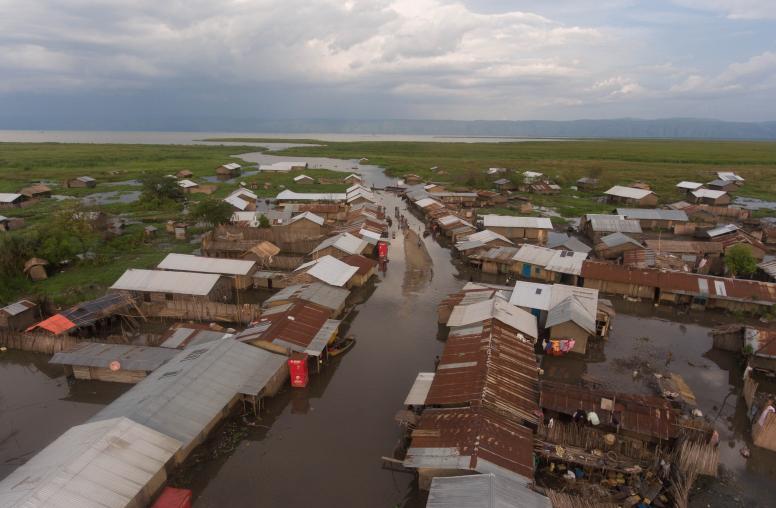“Children of War” Screening at United Nations Spotlights Efforts to Aid Child Soldiers
On October 12, at the United Nations General Assembly Hall -- the storied room in which world diplomacy is conducted -- an audience of approximately 800 guests watched the world premiere of the documentary "Children of War.” In November 2009, USIP co-hosted the film's first Washington, D.C. screening and tonight's event at the U.N. boosted the film's momentum to generate awareness of and action to end the plight of child soldiers.
On October 12, at the United Nations General Assembly Hall -- the storied room in which world diplomacy is conducted -- an audience of approximately 800 guests watched the world premiere of the documentary "Children of War.” In November 2009, USIP co-hosted the film's first Washington, D.C. screening and tonight's event at the U.N. boosted the film's momentum to generate awareness of and action to end the plight of child soldiers.
The setting itself underlined the U.N’s commitment and concern to end the use of child soldiers. Typically, U.N. visitors are allowed into the General Assembly Hall – but under strict instructions and watch to sit only in the blue chairs around the periphery of the Hall. The Hall itself is reserved for U.N. member state representatives and key staff; yet for this event, attendees filed past the rows of blue observer seats into the Hall itself, choosing their seats in rows whose placards identify which country’s representatives normally sit there. USIP staff sat in between Nauru and Namibia. Guests clearly appreciated the rare treat, taking photos of themselves seated in front of particular country placards as well as the great U.N. seal behind the stage.
 Most documentary filmmakers know that large numbers - such as the estimated 35,000 northern Ugandan children who have been abducted over the course of this 22 year war - often sound abstract to audiences. But, small numbers - such as three children, named Akulu, Nyero and Polycap - make us infinitely more engaged, and help the large statistics feel more real. "Children of War" tells the stories of three former combatants, and in telling their stories, evokes compassion for child soldiers all around the world.
Most documentary filmmakers know that large numbers - such as the estimated 35,000 northern Ugandan children who have been abducted over the course of this 22 year war - often sound abstract to audiences. But, small numbers - such as three children, named Akulu, Nyero and Polycap - make us infinitely more engaged, and help the large statistics feel more real. "Children of War" tells the stories of three former combatants, and in telling their stories, evokes compassion for child soldiers all around the world.
Set in the Rachele Rehabilitation Centre in northern Uganda, the film follows three former combatants who are now in a program to help them readapt to a nonviolent life, as they had before being abducted by the notorious rebels of the Lord's Resistance Army (LRA). One counselor, Jane Ekayu, is featured throughout as she explains the techniques she and her colleagues at the rehabilitation center use, and she also interviews the former child soldiers.
The film is as simple as it is heartrending and complex. It is hard to prepare to see a close up of a child who looks no more than 10 years old, looking straight into the camera while describing a killing in which he took part and even dealt the first violent blow. To hear a teenage girl admit, with shame, to being forcibly selected as an LRA commander's "wife," is simply jarring. "Children of War" was shot in black and white because, as filmmaker Bryan Single said, "color is very evocative emotionally," and he didn't want visual or colorful images to be "emotionally distracting from the content."
After the screening, filmmaker Single took part in a panel discussion with counselor Jane Ekayu, who flew in from northern Uganda, and U.N. Special Representative of the Secretary General for Children and Armed Conflict Dr. Radhika Coomaraswamy. It is Dr. Coomaraswamy's job to do all she can to end the use of child soldiers. In her opening remarks, Dr. Coomaraswamy commented that "this film captures so poignantly the human cost," of this exploitation of young people, and that is why she invited Single to show the film in such a dramatic public setting.
More than documenting the trauma faced by former combatants Akulu, Nyero and Polycap, “Children of War” follows the three spotlighted youths and a larger group of former abductees through difficult discussions of forgiveness and justice. In one scene, we see each student stand up to tell his or her views on whether or not repentant LRA commanders should be forgiven, and for these children who have perpetrated and suffered violence, these questions are entirely concrete. One student asks, "Were we not forgiven?" and another says that we children are innocent, we were forced into acts of violence. But, he asks, were the leaders forced?
A former top religious leader of the LRA, Abonga Papa, comes before a group of former child soldiers at the rehabilitation centre and asks for their forgiveness for his sins and for the sins of the rebels still in the bush. During the panel discussion, an audience member asked counselor Jane Ekayu what the rationale was for bringing such a figure to these children who are healing from traumas inflicted by the regime Abonga helped lead. Ekayu explained, "we want them to see face to face the children they harmed. We want to let the children ask questions." She said she wanted the children to see that Abonga and other former LRA leaders no longer have power over them, and to help the children develop a sense of their rights, "even as we try to build peace." She acknowledged that seeing such figures is difficult for the children, and that questions of forgiveness are also difficult, but urged, "let's begin from somewhere."
When asked about the reintegration of former combatants in northern Uganda, Ekayu said, “the film still portrays what is on the ground.” She laid out what she believes are three key issues for rehabilitating former child soldiers: first, children must be holistically rehabilitated to fully recover from their traumas; second, the war in this country must end; and third, the community must truly build peace to prevent a return to violence. Ekayu emphasized that these tenets hold true for all conflicts that involve children, not only in northern Uganda.
Asked how she felt traveling from northern Uganda, dealing with the trauma and stress her children face, and now, sitting with a microphone where world leaders sit, Ekayu said, "I feel very privileged ... I'm here speaking on behalf of the children."
Dr. Coomaraswamy was asked to respond to the classic skeptics’ question: What is the impact of hosting a film screening, or how can a movie help children halfway around the world. She described some of the U.N.’s efforts to form worldwide consensus for banning the practice of this form of child exploitation, and noted that the first case about to be prosecuted by the International Criminal Court involves child soldiers, with the trial of Thomas Lubanga, who was arrested in the Democratic Republic of Congo. Ultimately, she said that until all children are no longer forced into combat, the effort will not have succeeded. She said, “I accept that there is much more to be done, but at least now there is awareness.”
Filmmaker Single continues to travel around the U.S. and worldwide showing “Children of War,” and he is pressing for theatrical distribution as well as distribution to schools and libraries.
Explore
- Watch a trailer of “Children of War”
- Policy Forum on Children and Armed Conflict: Child Soldiers as Combatants, Victims, and Survivors
Event, September, 2008 - Child Soldiers: New Evidence, New Advocacy Approaches
Peace Brief, August 2007 - Healing and Reintegrating the Victims of Congo’s War
Peace Brief, July 2007
Other resources on film and peacebuilding:
- United States Institute of Peace Joins Silverdocs Film Festival
News Release, June 1, 2010



